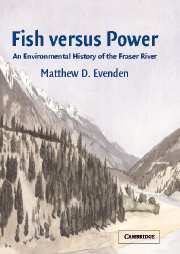Book contents
- Frontmatter
- Contents
- List of Tables, Figures, Photographs, and Maps
- List of Abbreviations
- Acknowledgments
- Introduction
- 1 “A Rock of Disappointment”
- 2 Damming the Tributaries
- 3 Remaking Hells Gate
- 4 Pent-Up Energy
- 5 The Power of Aluminum
- 6 Fish versus Power
- 7 The Politics of Science
- Conclusion
- Bibliography
- Index
7 - The Politics of Science
Published online by Cambridge University Press: 19 August 2009
- Frontmatter
- Contents
- List of Tables, Figures, Photographs, and Maps
- List of Abbreviations
- Acknowledgments
- Introduction
- 1 “A Rock of Disappointment”
- 2 Damming the Tributaries
- 3 Remaking Hells Gate
- 4 Pent-Up Energy
- 5 The Power of Aluminum
- 6 Fish versus Power
- 7 The Politics of Science
- Conclusion
- Bibliography
- Index
Summary
Before a gathering of business people in 1960, UBC fisheries biologist Peter Larkin reflected on the dynamics of the fish vs. power debate and broke the dispute into four “technical ingredients”: “the fish, fisheries biologists, engineers and dams.” With self-deprecation, Larkin described the purpose of the fisheries biologist thus:
The first characteristic of the fisheries biologist must be slipperiness. Recognizing that fish and their environment are variable, and that even with the best of observations, he has only a general understanding of what's going on, he is forced to approach every problem with a becoming caution. Things are never so; they seem to be, are apparently, they are indicative, it is suggested, maybe they are true. And always from a biologist expect lots of adjectives and adverbs, slightly, moderately, reasonably, average. Fishery biology is largely the art of saying ‘probably’ in 1000 ways.
If a fisheries biologist is known as an expert, it is probably because he says nothing or because everything he says can be construed as a completely satisfactory prediction regardless of what happens.
The poor fisheries biologist on the other hand is characterized by his over-confidence. Fancying himself as something of a jet age scientist, and feeling compelled by our scientifically minded society to put up or shut up – he recklessly tries to put up – promising the moon, hoping memories are short, and looking for scapegoats at the hour of disenchantment ….
- Type
- Chapter
- Information
- Fish versus PowerAn Environmental History of the Fraser River, pp. 231 - 266Publisher: Cambridge University PressPrint publication year: 2004



